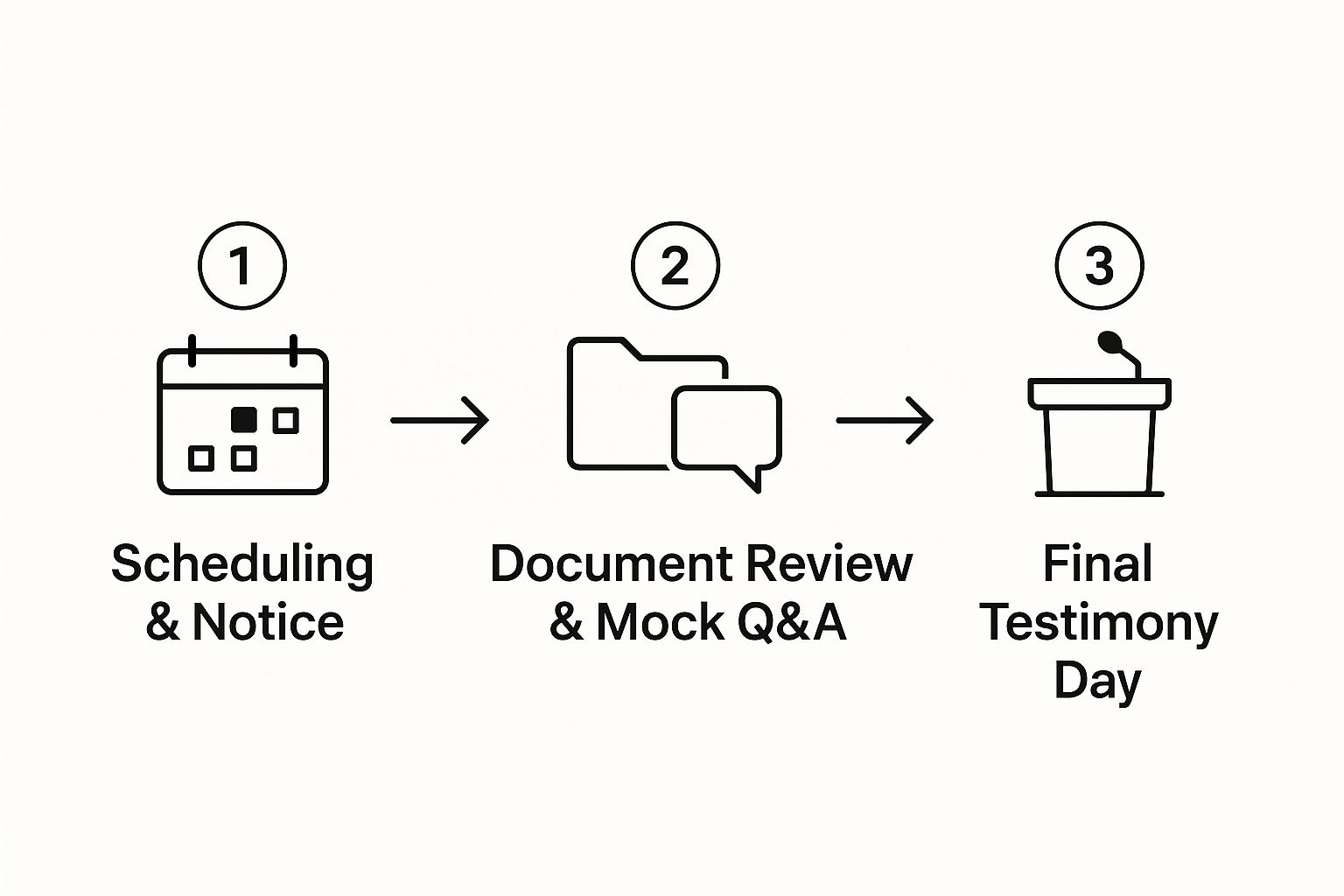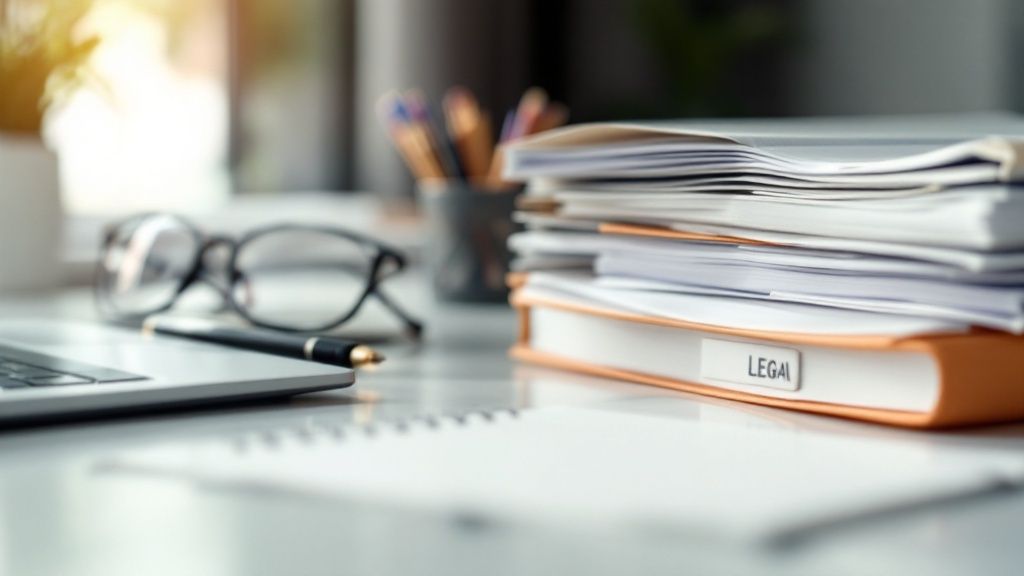How to Prepare for Deposition: Expert Tips for Success
"I was satisfied once John Bell took over my case."
"Communication was always timely."
How to Prepare for Deposition: Expert Tips for Success
Getting called for a deposition can be nerve-wracking, but with the right preparation, you can walk in feeling confident and in control. A deposition isn't courtroom drama; it's a structured, out-of-court Q&A session where you give sworn testimony. Mastering this process starts with understanding exactly what's going to happen and what your role is.
Understanding Your Role in the Deposition Process
First, let's demystify what a deposition actually is. It’s a formal, crucial part of the "discovery" phase that happens before a trial. The main goal is for the opposing lawyer to gather information, find out what you know, and lock in your testimony for the record. They want to hear your side of the story, in your own words, long before a judge or jury ever might.
Think of it like an open-book test where you are the book. The other side's attorney is trying to read every chapter. Your job—with your lawyer right beside you—is to answer truthfully and accurately, without giving away any extra information or plot twists they didn't ask for.
Who Is in the Room
Knowing who you'll see in the room can take a lot of the anxiety out of the equation. It might feel like a performance, but everyone there has a very specific job.
- The Deponent: That’s you. You are there to provide honest, factual answers under oath.
- Your Attorney: Your lawyer is your shield. They're there to protect your interests, object to improper questions, and offer guidance when you need it.
- Opposing Counsel: This is the lawyer for the other party in the lawsuit. Their job is to ask you questions to uncover facts that help their case.
- The Court Reporter: This is a neutral professional who records every single word said during the deposition. They create the official written transcript.
This entire process, from getting the notice to sitting down for the deposition, follows a clear path.

As you can see, a successful deposition isn't an accident. It's the direct result of a methodical preparation process that involves both logistical planning and strategic practice with your legal team.
Your Primary Goal as a Witness
Your main objective is simple but absolutely critical: answer every question truthfully. You aren't there to win the case, spin a compelling narrative, or debate the opposing counsel. Your sole purpose is to provide the facts as you know them. Period.
The best witnesses aren't always the most charismatic speakers; they are the most careful listeners. Your real power comes from pausing, thinking through the question, and then answering only what was asked.
This disciplined approach is your best defense against accidentally volunteering harmful information or getting drawn into a conversational trap. Once you understand that your role is simply to be a clear, honest source of facts, the pressure melts away. This mindset is the bedrock of a successful deposition.
To give you a clearer roadmap, here's a quick overview of the key preparation stages.
Deposition Preparation At-a-Glance
| Initial Consultation | Understand the deposition's scope and purpose. | Meet with your attorney to discuss the notice and case strategy. |
| Document Review | Master the key facts and evidence in your case. | Thoroughly review all relevant documents, emails, and records. |
| Practice Session | Build confidence and refine your testimony skills. | Conduct a mock deposition (or "prep session") with your lawyer. |
| Final Logistics | Ensure a smooth, stress-free deposition day. | Confirm the time, location (virtual or in-person), and what to wear. |
Following these stages turns a daunting event into a series of manageable steps, putting you in the driver's seat.
Reviewing Key Documents and Case Facts

A powerful deposition isn’t about memorizing a script. It’s about knowing the facts of your case inside and out. Your testimony is only as strong as your command of the details, and that starts with a deep dive into every relevant document.
Your attorney will point you toward the most critical evidence, but this is where you need to be an active partner in your own case. Get ready to methodically review emails, contracts, text messages, medical records—whatever is central to the dispute. The goal is to refresh your memory so completely that the facts become second nature.
Creating a Clear Timeline of Events
One of the best ways I’ve seen clients get a handle on the facts is by building a simple timeline. This exercise can take a chaotic jumble of events and turn it into a clear, logical story. Just start at the beginning and map out every key milestone.
For instance, in a personal injury case, your timeline would probably include:
- The exact date and time of the incident.
- The date you first went to a doctor.
- Any important conversations you had with insurance adjusters.
- Dates of follow-up appointments, surgeries, or new diagnoses.
This chronological map helps you recall events with precision and keeps them in the right context, which is a lifesaver when you're under pressure. If you've been in a car crash, knowing what evidence to gather for your auto accident case is the perfect starting point for building this timeline.
When you have a firm grip on the sequence of events, it's much harder for the other side's lawyer to knock you off balance with confusing questions about timing.
A common tactic opposing counsel uses is to jump around in time, asking questions out of order to see if your story wavers. A solid timeline is your best defense against this trick, helping you keep your testimony consistent and credible.
Identifying Key Details and Inconsistencies
As you review everything, you and your lawyer aren't just looking for the good stuff. You're also on the hunt for potential weak spots—the inconsistencies the other side will surely try to exploit. Does an email from March seem to contradict an official report from April? Is there a gap in your medical treatment that needs a solid explanation?
Finding these issues ahead of time is a huge strategic advantage. It gives you and your attorney the chance to develop honest, accurate ways to address them. Remember, no case is perfect. It’s far better to acknowledge a minor discrepancy with a prepared answer than to be caught off guard during the deposition.
This whole process means you'll be handling a lot of sensitive information, so making sure it all stays secure is paramount. For anyone curious about the technical side of protecting legal documents, this detailed law firm data security guide is an excellent resource. By knowing your documents—the good, the bad, and the fuzzy—you eliminate surprises and take control of your own story.
Working With Your Attorney to Build a Strategy

Think of your attorney as your coach for the deposition. They're not just there to represent you legally; they're your strategist and your defender. The prep sessions you'll have together are, without a doubt, the most critical part of your preparation. This is where the raw facts of your case get shaped into a solid game plan.
These meetings are much more than a simple document review. They are hands-on, interactive sessions where you and your lawyer build a cohesive narrative. They will walk you through the core theory of the case—the story we are telling the court—and show you exactly how your testimony slots into that bigger picture.
It's vital that you understand your specific role. Are you the key witness establishing a timeline of events? Are you there to detail the extent of your injuries? Or is your main purpose to confirm a single, crucial conversation? Knowing your primary function helps keep your answers focused and prevents you from accidentally wandering into areas that don't help your case.
The Power of the Mock Deposition
One of the best tools in your attorney's arsenal is the mock deposition. It’s essentially a dress rehearsal for the real thing. Your attorney will take on the role of the opposing lawyer, firing tough and pointed questions at you to see how you react under a little pressure.
Sure, it can feel a bit awkward at first, but this practice is priceless. It gets you used to the pace of the questioning and helps you build the muscle memory needed to give clear, factual answers. This is also where you'll learn to handle the tricky questions that are almost guaranteed to come up.
- Hypotheticals: Opposing counsel loves to ask things like, "What would you have done if...?" Your lawyer will train you to stick to the facts and avoid speculating.
- Leading Questions: These questions are designed to put words in your mouth, such as, "You were speeding, weren't you?" You'll practice how to pause, re-center, and answer based on what actually happened, not on their loaded framing.
- Forced 'Yes' or 'No' Answers: An opposing attorney might insist on a simple yes or no when the truth is more nuanced. Your lawyer will show you how to navigate this without appearing uncooperative.
This dry run is your chance to find any weak spots in your testimony and strengthen them in a completely safe, private setting.
Understanding Attorney-Client Privilege
During your prep, your attorney will also explain some key legal guardrails, like attorney-client privilege. This is a fundamental rule that keeps all communications between you and your lawyer completely confidential. It’s a huge reason why finding the right legal partner from the very beginning is so critical. If you're still in that process, our guide on hiring a personal injury attorney offers some great insights on what to look for.
So, in the deposition, if the other side asks, "What did your lawyer tell you to say about the accident?"—that's a direct violation of privilege.
Your attorney will immediately jump in with an "Objection" and instruct you not to answer. Your only job in that moment is to stop talking. Don't try to explain yourself. Just let your lawyer handle the legal sparring.
This strategic silence is one of your most powerful tools. By working closely with your attorney, you present a truly unified front. You'll walk into that deposition room not just as a witness, but as a well-prepared, confident member of a legal team, ready for anything.
Taking a Deposition Across Borders
When a key witness is in another country, the familiar deposition process gets a lot more complicated. Legal cases are more global than ever, and that means navigating different legal systems, cultural nuances, and some serious logistical puzzles. This isn't just about setting up a video conference; it's a high-stakes planning exercise where every detail matters.
Getting this right means your legal team has to become fluent in foreign procedural rules. You’re suddenly dealing with visas, finding a neutral and legally permissible location, and sourcing local professionals like court reporters, videographers, and interpreters who actually understand complex legal terms. Each piece adds time and money to the puzzle, so getting ahead of it is the only way to keep things on track.
Navigating Jurisdictional Hurdles
The biggest headache is often the law of the land where the witness lives. You can't just assume the way you do things in the United States is acceptable elsewhere. Some countries see a foreign legal team taking testimony on their soil as an infringement on their judicial sovereignty, which can lead to anything from strict rules to a flat-out ban.
This is where you have to get creative. For example, China doesn't allow foreign lawyers to conduct depositions within its borders. What do legal teams do? They often arrange for the witness to travel to Hong Kong or Taiwan. It's a similar story for Russian witnesses, who frequently travel to Finland, or Austrian deponents who might meet in the Czech Republic to take advantage of easier travel under Schengen Area agreements. Knowing these workarounds is absolutely critical. You can learn more by exploring these global deposition challenges to see how different teams adapt.
Logistics for a Smooth Process
Once you’ve found a country that will actually let you hold the deposition, the focus shifts to the nitty-gritty logistics. This is everything from booking flights to making sure the tech works flawlessly, whether you’re there in person or connecting remotely.
Here are a few things that need to be on your checklist:
- Picking a Venue: If you have to use a U.S. consulate, as is often required in places like Japan or Germany, you need to book the space months in advance. They fill up fast.
- The Tech Setup: For remote depositions, test everything. Test the platform, check the internet stability on both ends, and line up a professional videographer who knows what they're doing.
- Handling Documents: Shipping boxes of exhibits overseas isn't like sending a domestic package. You have to plan carefully to avoid customs delays that could bring everything to a halt.
- Vetting Interpreters: You don't just need someone who speaks the language. You need a certified interpreter who is an expert in the specific legal and technical subject matter of your case. It’s a non-negotiable.
A classic mistake is underestimating how long all this takes. A single box of exhibits stuck in customs or a last-minute cancellation from an interpreter can derail the entire proceeding, wasting thousands of dollars and precious time.
At the end of the day, an international deposition is a major project management test. Your team has to think like a chess master, anticipating roadblocks ranging from geopolitical tensions to a simple time zone mix-up. By tackling these unique international factors head-on with a detailed, forward-thinking plan, you can get the testimony you need to build your case, no matter where in the world your witness happens to be.
Best Practices for Deposition Day Testimony

When deposition day arrives, how you act is just as critical as what you say. Every word, every hesitation, and every gesture is being recorded and scrutinized. Your goal is simple: be a calm, credible, and factual witness, even if the questions get tough.
The most powerful tool at your disposal is the strategic pause. Before you utter a single word in response to a question, take a deep breath. This small act is a game-changer. It gives you a moment to process the question fully and, just as importantly, it gives your lawyer a chance to object if the question is out of line.
The Golden Rules of Answering Questions
Your job is to answer truthfully, and only truthfully. You're not there to tell a story or fill in the blanks. Opposing counsel is an expert at using a friendly, conversational tone to get you to volunteer extra information—details that can and will be used against you. Don't fall for it.
- Listen to the Full Question. Don't jump ahead or assume you know what's being asked. Let the attorney finish completely before you even start thinking about your answer.
- Answer Only the Question Asked. This is crucial. If the lawyer asks, "Do you know what time it is?" the correct answer is "Yes." It is not "Yes, it’s 2:15 PM." Give a direct, concise answer, and then stop talking.
- "I Don't Know" Is a Perfectly Good Answer. The same goes for "I don't recall." A deposition is not a memory test. If you are not 100% certain about something, do not guess or speculate. Stating you don't know is the most honest and safest response.
Remember, a deposition is not a conversation. It is a formal, on-the-record proceeding where you are providing sworn testimony. Your only duty is to state the facts you know and remember at that moment.
This disciplined approach is your best defense. It keeps you from misspeaking or accidentally opening up new, damaging lines of questioning for the other side. This mindset is just one piece of the puzzle; it also helps to understand the bigger picture of how your deposition fits into the legal process. Knowing the likelihood you will have to go to court can provide valuable context for your testimony. You can find more information about that process here: https://www.belllawoffices.com/will-i-have-to-go-to-court/
Staying Composed and Credible
Your physical presence speaks volumes. How you carry yourself and what you wear can directly affect how credible you appear. Dress like you're heading to an important business meeting—professional, clean, and conservative.
Maintaining your composure is non-negotiable, especially if the opposing lawyer tries to get aggressive. This is often a deliberate tactic meant to rattle you, hoping you'll get angry and say something you shouldn't. Don’t take the bait.
- Be a Rock. Keep your tone even and your expression neutral.
- Make Eye Contact. Look directly at the attorney who is questioning you.
- Ask for Breaks. Depositions are mentally draining. If you start to feel tired, confused, or just need a moment, ask your attorney for a break. You are entitled to them.
These breaks are your opportunity to reset and privately confer with your lawyer. While you can't bring notes into the room with you, jotting down key points afterward can be incredibly helpful for your legal team. For anyone wanting to brush up on this skill, reviewing some effective note-taking strategies is a great place to start. By sticking to these practices, you ensure your testimony is presented as clearly and accurately as possible, solidifying your role as a trustworthy witness.
Answering Your Lingering Deposition Questions
Even with the best preparation, a few nagging questions can pop up right before you walk into that room. Getting these sorted out can be the final piece of the puzzle, giving you the confidence you need. Let’s tackle some of the most common worries I hear from clients.
What's the One Thing I Absolutely Must Do?
If you take away only one piece of advice, let it be this: always tell the truth. It sounds simple, but it’s the bedrock of your testimony. Lying under oath is perjury, a serious crime, and it’s just not worth it.
Right behind that is a rule that’s almost as important: listen carefully and answer only the question you were asked. Resist the urge to volunteer extra details, explain your answer, or fill in silent gaps. If you don’t know, the best answer is, "I don't know." If you can’t remember, it’s perfectly fine to say, "I don't recall."
One of the most powerful things you can do is simply pause for a few seconds before answering. That small gap gives you time to process the question and gives your lawyer a chance to object if they need to.
Can I Bring My Notes With Me?
I almost always advise my clients not to bring notes into a deposition. The reason is simple: any document you look at or use to refresh your memory during your testimony can be demanded by the other side’s attorney.
Suddenly, your private notes, reminders, and even little doodles can become an official exhibit. They can be picked apart and used to question your memory or credibility. It's much safer to trust the work you've already put in with your attorney during your prep sessions. If you feel you absolutely need something, clear it with your lawyer first.
What if I Say Something Wrong by Accident?
It happens. In the heat of the moment, you might misspeak or realize an earlier answer was incorrect. Don't panic. The key is to correct it as soon as you realize the mistake.
Just say, "I'd like to correct something I said earlier." Your attorney will help you get the record straight.
You'll also get a chance to review the written transcript of your testimony after the deposition is over. If you spot any errors then, you can make corrections on what’s called an "errata sheet." A word of caution, though: making major changes after the fact can look suspicious and might be used against you later. It’s always best to be as accurate as possible in the moment. Always, always discuss any potential corrections with your attorney.
Facing a legal battle can feel like a lonely road, but you don't have to walk it alone. The experienced attorneys at Bell Law are here to guide you through every step, from deposition prep to fighting for the compensation you deserve. You can contact us for a consultation to get started.
Disclaimer: The information on this page is provided for general informational purposes only and is not legal advice. Reading this content does not create an attorney-client relationship. For advice about your specific situation, please contact a licensed attorney.







